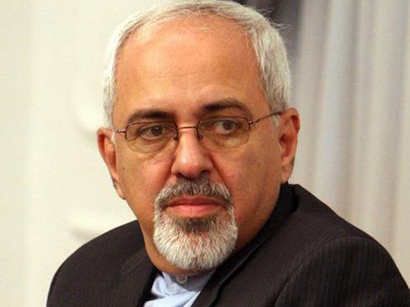Baku, Azerbaijan, Feb. 20
By Umid Niayesh - Trend:
Iran's defense power is not a topic for the negotiations with the P5+1 countries, Iranian foreign minister, Mohammad Javad Zarif said, Iranian State IRINN TV reported on Feb. 20.
Zarif made the remarks during a press conference in the Vienna at the end of the latest round of the nuclear talks. The discussions were the first round of high-level negotiations between Tehran and the six world powers after the two sides arrived at a landmark interim deal in the Swiss city of Geneva on November 24, 2013.
Under the deal, the six countries undertook to provide Iran with some sanctions relief in exchange for Iran agreeing to limit certain aspects of its nuclear activities during a six-month period. It was also agreed that no nuclear-related sanctions will be imposed on Iran within the same timeframe.
The agreement, dubbed the 'Geneva Joint Plan of Action' went into effect on Jan. 20.
"All sides agree that only the nuclear issue will be discussed in the upcoming negotiations and Iran's power defense will not be included in talks," Zarif underlined.
Iranian officials earlier rejected U.S. calls for its ballistic missile program to be included as part of the negotiated nuclear deal.
Earlier in February, the U.S. negotiator Wendy Sherman admitted before Congress that the United States had "not shut down" Iran's ballistic missile program.
"That is indeed something that has to be addressed as part of a comprehensive agreement," Sherman underlined.
Zarif also went on to say that closing of the Iranian nuclear sites is not a topic for discussions.
While responding to a question about any agreed, written documents, Zarif said that "during the negotiations nothing was written between the sides."
He also underlined that the negotiation sphere was respectful and positive.
He said that making nuclear weapons is against Iran's national security according to the country's strategic viewpoint and is banned by the Supreme Leader, Ayatollah Ali Khamenei.
Implementation of the Additional Protocol can be a topic for negotiations, as it has mentioned in the Geneva deal, Zarif said, adding that the protocol should be ratified by the Iranian parliament before implementation.
The Additional Protocol allows unannounced inspections outside of declared nuclear sites and it is seen as a vital tool at the IAEA's disposal to make sure that a country does not have any hidden nuclear work. Additional Protocol was endorsed earlier by Iran in 2003, but wasn't officially ratified by the country's parliament.
Commenting on the agenda of the upcoming negotiations Zarif said that the Joint Plan of Action which was agreed to in Geneva will be the framework of the talks.
"In some issues the two sides have similar viewpoints and in some others different," he said, remarking that the two sides agreed to continue negotiations on the issues which viewpoints are similar. He did not further explained the issues which the sides have different viewpoints.
The nuclear negotiations have a difficult path ahead, Zarif underlined.
The sides should take care of their statements which may increase the Iranian people's mistrust, the foreign minister added.
The western side should benefit from the chance which has been provided by Iranian people, he remarked.
"Some comments are not useful for the negotiation's process and only pressure groups benefit them," Zarif said. He also seriously criticized hard-line Iranian media for publishing "unrelated issues and false translation" of his statements and providing material for pressure groups.
The U.S. and its Western allies suspect Iran of developing a nuclear weapon - something that Iran denies. The Islamic Republic has on numerous occasions stated that it does not seek to develop nuclear weapons, using nuclear energy for medical researches instead.






